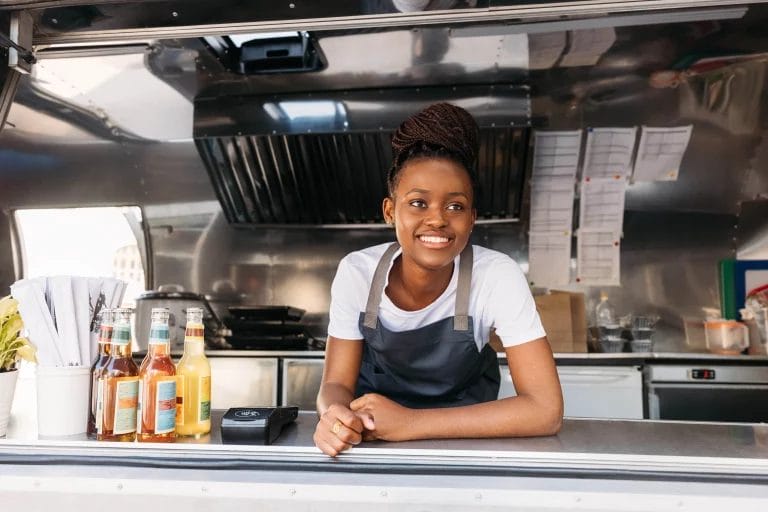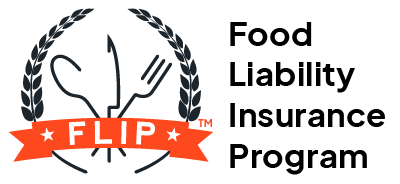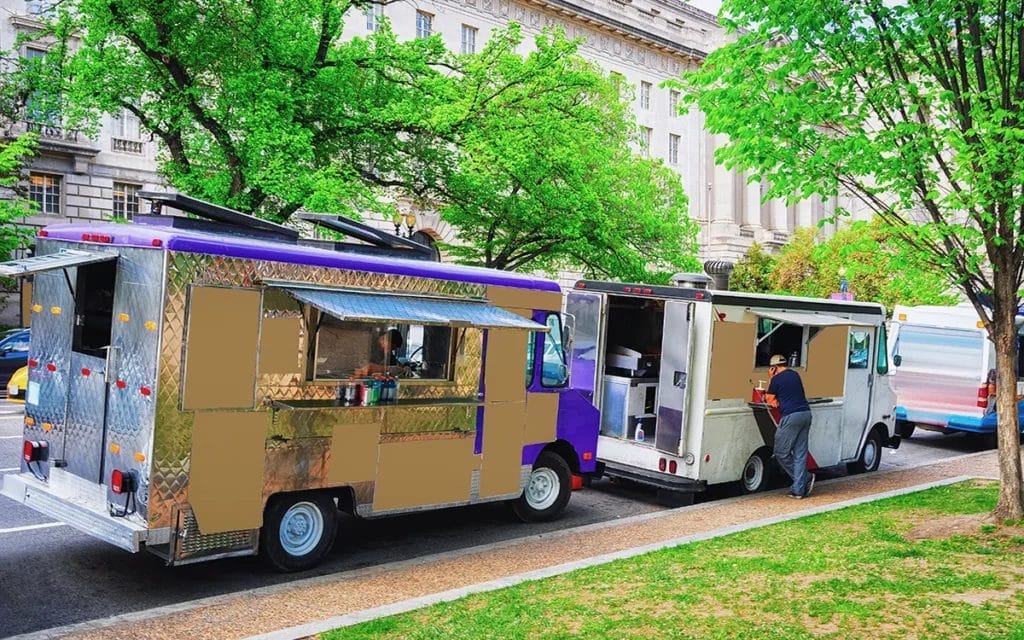Are you excited to break into D.C.’s dynamic food truck scene? The mobile food vendors are as unique as the district itself, so buckle up and get ready for a busy, food-filled ride!
Our guide will help you navigate what’s required to start a food truck in Washington, D.C., from the licenses you need to the costs you’ll have to prepare for.
Find out why D.C. made our list of the best cities for starting a food truck! Check out the full report today.
Understand Food Truck Requirements in D.C.
There are a few requirements you must meet before you start applying for D.C. licenses and permits:
- Business name: Your food truck needs a name that is easy to remember and unique enough to stand out from the crowd. It should clearly describe what kind of food you sell.
- Business classification: Sole proprietorships, partnerships, and limited liability companies (LLCs) are popular classifications for food trucks. This affects the structure of your business, as well as how it’s taxed.
- Business plan: Develop a business plan to keep all the details about your business and your strategy in one place, so you stay on track throughout your journey. Many banks and lenders will require you to submit your plan before they issue a loan.
- Certificate of Insurance (COI): This document includes details about your coverage that festival managers and venues want to see before you’re allowed to participate, including your policy limits.
- Corporate registration: You must register your business and trade name with D.C.’s Corporations Division, unless your food truck is a sole proprietorship.
- Employer identification number (EIN): The Internal Revenue Service (IRS) issues your EIN, which it uses for tax purposes.
- Tax registration: Register with the D.C. Office of Tax & Revenue by filling out form FR-500. Then, request a Certificate of Clean Hands (just make sure it’s dated within 30 days of your vending business license application — more on this later).
Obtain D.C. Food Truck Licenses & Certificates
D.C. requires you to carry a variety of food truck licenses to operate legally.
Health Certificate
- Requires submission of a Mobile Food Vending Application with DC Health
- Cost: $100
- Where to get it: DC Health
Mobile Food Vending Hazard Analysis and Critical Control Points (HACCP) Plan Review
- Required for food trucks selling high-risk foods or using high-risk preparation methods, as determined by DC Health
- Cost: $75
- Where to get it: DC Health
Class A Vending Business License
- A business license with a vending endorsement
- Cost: $476.30
- Where to get it: DC Department of Licensing and Consumer Protection
Certified Food Protection Manager (CFPM) Certificate
- A CFPM must be present during operating hours to ensure food safety procedures are followed
- Cost: Varies depending on the course
- Where to get it: Acceptable organizations for CFPM courses
Sidewalk Site Permit
- Allows you to operate legally from a public sidewalk location
- Cost: $150 for a two-year permit
- Where to get it: DC Department of Licensing and Consumer Protection
Mobile Site Permit
- Allows you to operate legally from a designated mobile vending zone
- Cost: $300 for a two-year permit
- Where to get it: DC Department of Licensing and Consumer Protection
Follow Food Truck Laws in D.C.
D.C.’s food truck laws are designed to ensure all mobile food businesses operate safely and legally, preventing harm to public health. It’s crucial to learn the laws regulating your food truck because violating them (knowingly or not) can result in a fine, license suspension, or closure.
Some of the laws to familiarize yourself with include:
- Food truck design requirements: The Department of Licensing and Consumer Protection (DLCP) requires food trucks to meet specific design standards. This includes requiring certain food trucks to include freshwater tanks and hand-washing sinks if they sell potentially hazardous foods.
- Service support facility: All food trucks must have access to a service support facility, such as a commercial kitchen, for support with food preparation, storage, cleaning equipment and utensils, etc. This also includes a secure depot location for parking your truck outside operating hours.
- Regular health inspections: D.C. food trucks must submit to health inspections every six months to ensure they are operating according to DC Health’s standards.
Pro Tip: Check out DC Health’s full list of regulations for mobile food vendors for more information.
Get D.C. Food Truck Insurance
It may not be the most glamorous part of starting your food truck, but insurance is critical for your business. This includes:
- Commercial auto insurance to provide coverage for physical damage and injuries/property damage your truck causes to others (required in D.C.)
- Food truck liability insurance to cover injuries and property damage you cause to others while doing business
Accidents can happen to anyone, and they can be a serious financial burden on your business. In fact, we found that the average food truck insurance claim costs $6,271.
Getting insured can save you money by covering those costs so you don’t have to pay them out of pocket. Also, many festivals and commercial kitchen owners will ask to see proof of your food truck liability insurance before working with you.

Learn the Cost of Starting a Food Truck in D.C.
The U.S. Chamber of Commerce Foundation estimates the average food truck owner spends over $28,000 to meet legal requirements in the first year of business.
As you budget, be sure to factor in the following expenses as well:
- Food truck
- New: $77,500–$155,000
- Used: $32,500–$85,000
- Custom-branded wrap: $2,500–$5,000
- Cooking equipment
- Grill or griddle: $2,500
- Deep fryer: $1,200
- Convection oven: $1,000–$3,500
- Microwave: $250–$800
- Refrigeration
- Refrigerator/freezer combo: $2,000–$5,000
- Prep table with refrigeration: $1,000–$3,000
- Safety and sanitation
- Three-compartment sink: $1,000–$2,500
- Handwashing sink: $200–$500
- Fire suppression system: $1,500–$3,000
- First aid and personal protective equipment (PPE): $100–$300
- Power supply
- Generator: $3,000–$10,000
- Backup power: $500–$2,000
- Technology
- Point of sale (POS) system: $1,000–$3,000
- Inventory software: $20–$200/month
- Tablet: $300–$1,000
- WiFi or mobile hotspot: $100–$300
Pro Tip: To cover these costs and protect your profit margins, use a proven pricing strategy for your menu.
Sell at D.C. Food Festivals
As the D.C. food truck industry has grown, food trucks have become a staple at a variety of D.C. festivals and events.
These are excellent opportunities to promote your food truck to new customers and expand your reach. Just make sure you have your Certificate of Insurance (COI) on hand for when the organizer asks for it!
Here are a few popular festivals in and around the D.C. area to apply to when your truck is up and running:
Pro Tip: Check out our festival directory for more foodie events nearby!
FAQs About Starting a Food Truck Business in D.C.
Does My D.C. Food Truck Equipment Have to Be Approved Before I Can Use It?
Yes. As part of your Hazard Analysis and Critical Control Points (HACCP) plan review, you must include the types of equipment you plan to include in your food truck. It’s generally recommended that you wait to purchase any equipment before passing your plan review, so you don’t buy gear you can’t use.
Are There Specific Zoning Regulations for Food Trucks in D.C.?
Yes, D.C. has established Motor Roadway Vending Zones (MRV zones) for food trucks you can view via this map. However, D.C. encourages all food trucks to use this map as a guide to where they can park and sell their food, but default to the guidance posted on any official signs in that area.
What Are the Fire Safety Requirements for Food Trucks in D.C.?
- Propane gas: If your food truck uses a propane gas tank, you must apply for a permit and follow the proper storage and usage guidelines established by the Fire Prevention Division of DC Fire and Emergency Medical Services (EMS).
- Fire marshal approval: Your food truck must be inspected by the fire marshal from D.C Fire and Emergency Medical Services (FEMS).
- Fire extinguisher and hood: You need an approved fire extinguisher and ventilation hood installed in your food truck, as outlined in the vending handbook.

Alex Hastings
Seattle-based copywriter and (WA) licensed insurance agent Alex Hastings leverages her experience as a lover of fast-casual food, baked goods, and iced oat milk lattes. She holds a B.A. in Creative Writing from Western Washington University. Before working at Veracity, she was a retail copywriter at Zulily and an English language teacher in South Korea. Alex is fully trained on FLIP insurance coverages and writes content that connects food and beverage business owners with the policies they need.
Seattle-based copywriter and (WA) licensed insurance agent Alex Hastings leverages her experience as a lover of fast-casual food, baked goods, and iced oat milk lattes. She holds a B.A. in Creative Writing from Western Washington University. Before working at Veracity, she was a retail copywriter at Zulily and an English language teacher in South Korea. Alex is fully trained on FLIP insurance coverages and writes content that connects food and beverage business owners with the policies they need.

Kyle Jude
Kyle Jude is the Program Manager for Food Liability Insurance Program (FLIP). As a dedicated program manager with 10+ years of experience in the insurance industry, Kyle offers insight into different coverages for food and beverage business professionals who are looking to navigate business liability insurance.
Kyle Jude is the Program Manager for Food Liability Insurance Program (FLIP). As a dedicated program manager with 10+ years of experience in the insurance industry, Kyle offers insight into different coverages for food and beverage business professionals who are looking to navigate business liability insurance.

